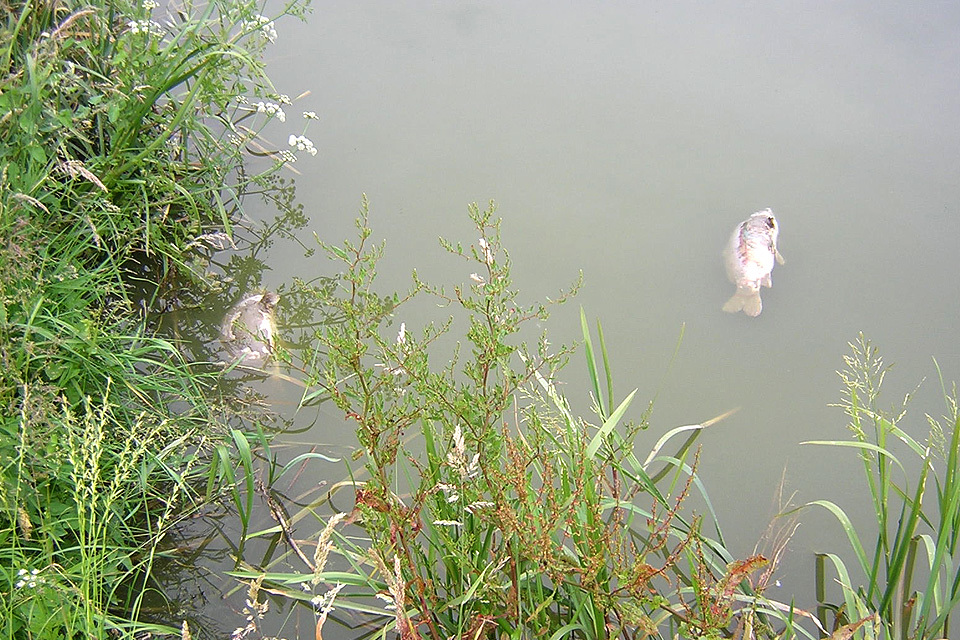
Outbreaks of Koi herpesvirus (KHV) disease in 2019
Published By GOV.UK [English], Fri, Feb 12, 2021 9:43 AM
KHV is a serious viral disease of fish and is a listed disease in the United Kingdom. It affects all varieties of common and ornamental carp species (Cyprinus carpio) and can result in large scale mortalities.
Fish with KHV disease may show the following signs, especially when water temperatures are between 16 to 28 °C:
necrotic (white or brown) patches on the gills
rough patches on the skin and sloughing mucous
sunken eyes
You must contact the FHI if you suspect an outbreak of KHV. This includes fish with the above signs, or deaths of carp or carp hybrids.
There is no risk to public health.
Controls lifted
Sites with KHV disease must undergo a formal monitoring programme for the duration of the calendar year immediately following the outbreak. The FHI visit these sites to look for evidence of disease and to inspect compliance with the conditions of the statutory controls in place. The controls are removed if the disease doesn’t reoccur during this period.
Some sites choose to cull and disinfect their stocks, rather than undergo monitoring.
Diseases controls lifted at:
Gatwick Koi - The Forge, West Sussex - 8 Jan 2019
Koi Water Garden - Henley-on-Thames, Oxfordshire - 14 Jan 2019
Bannister House Fishery, Lancashire - 4 Aug 2017
Boating Lake, Northamptonshire - 12 Oct 2017
Church Lane Lake, Essex - 6 July 2018
Newstead and Annesley Country Park, Nottingham - 6 July 2018
Parkers Fishery Pools, West Midland - 6 July 2018
Mawgan Porth Pools and Lake, Cornwall - 9 July 2018
Mill Farm Fishery, Hereford - 13 July 2018
Holme Grange Fishery, Berkshire - 19 July 2018
Clear Water Fisheries, Lancashire - 24 July 2018
Trench Pool, Shropshire - 24 July 2018
Old Hough Fishery, Cheshire - 25 July 2018
Woodside Fishery, Hereford & Worcester - 31 July 2018
Coopers Arms, Derby - 1 August 2018
K Lakes, Skegness - 2 August 2018
Martham Pits, Norfolk - 3 August 2018
Ashland Lakes, Buckinghamshire - 7 August 2018
Shadwell Pool, Greater London - 8 August 2018
Locklands Lake, Lincoln - 9 August 2018
Acton Park Lake, Wrexham - 13 August 2018
Canvey Lake, Essex - 14 August 2018
Stoneham Lakes, Hampshire - 17 August 2018
Lakewood Fisheries, Scunthorpe - 29 August 2018
Middle Pool, Shropshire - 18 September 2018
Gatton Waters, Norfolk - 28 September 2018
Watmore Farm Fishery, Hampshire - 2 October 2018
Orchard Lakes, Hampshire - 3 October 2018
Broadlands Lake Complex, Hampshire - 5 October 2018
Mescar Fishery - Liverpool, Merseyside – 22 July 2019
Orsett Reservoir - Greys, Essex – 24 July 2019
Ash Ponds - Martock, Somerset - 01 August 2019
Theydon Bois Valley Lakes - Epping, Essex - 06 August
Newt Pond - Haverhill, Suffolk - 08 August
Alders Farm Fishery - Milton Keynes, Buckinghamshire - 12 August
Priors Carp Fisheries, Essex - 13 August
Marley Pit, Staffordshire - 15 August
JCB Lakes - Rocester, Staffordshire - 30 August
Sivyers Lake, Middlesex - 13 September
Froghall Fisheries, Louth, Lincolnshire - 16 September
Bishops Bowl Fishery, Southam, Warwickshire - 18 September
Harry’s Fishery, Lancashire - 20 September
Denne Farm, Horsham, West Sussex - 30 September
Abingdon Pits, Abingdon, Oxfordshire - 16 October
Stanborough Lakes, Welwyn Garden City, Hertfordshire - 18 October
Kippax Park, Leeds - 26 September 2018
Further information
You can:
view all KHV disease outbreaks, their locations, and controls
find out more about KHV disease
take steps to prevent the introduction and spread of KHV disease
Background
Koi herpesvirus disease (KHV) is a listed disease under The Aquatic Animal Health (England and Wales) Regulations 2009. KHV outbreaks have been subject to statutory controls in the UK since 2007. The UK maintains a surveillance programme for this disease.
When the FHI confirm an outbreak, they take steps to control and, wherever possible, remove the disease. This may involve movement controls on susceptible species in the affected area, enhanced biosecurity, culling of fish, and cleaning and disinfecting of the premises.
Once statutory controls are in place the site operators must write to the FHI to get permission to move live fish into, out of, or within the designated area, and to make material changes to the site or site activities. This also applies to fish eggs and gametes.
Press release distributed by Media Pigeon on behalf of GOV.UK, on Feb 12, 2021. For more information subscribe and follow